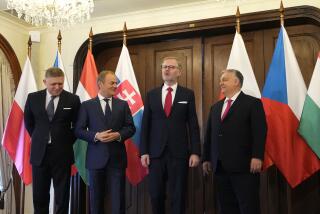Thatcher, Kohl, Chirac Display Differing Arms Control Views
- Share via
WEST BERLIN — The leaders of Britain, West Germany and France pointed to the Berlin Wall on Friday as evidence of Soviet rule and warned that the West must not be lulled by a single arms accord.
Addressing a meeting of the International Democratic Union, an association of conservative parties from 25 nations, in the old German Reichstag, the leaders said that much remains to be done to reduce East-West tensions. But they offered differing ideas of what the next step in arms control should be after the tentative pact to remove U.S. and Soviet intermediate-range nuclear missiles.
British Prime Minister Margaret Thatcher said Moscow’s “dreaded” superiority in chemical weapons must be eradicated. She added that it is unwise to seek further nuclear cuts in Europe until a conventional military balance is achieved.
“The nuclear deterrent is the most powerful deterrent against war the world has ever known,” Thatcher said. “It must remain.”
French Premier Jacques Chirac said talks to reduce the “central (nuclear) arsenals of the Soviet Union and the United States” were the priority.
Chancellor Helmut Kohl, calling for a joint North Atlantic Treaty Organization strategy on the next phase of negotiations, stressed the special threat to West Germany from Soviet battlefield nuclear arms based in Eastern Europe.
Support for West Berlin
In his welcoming speech, Kohl called for Western solidarity with West Berlin, an enclave surrounded by Communist East Germany and cut off from East Berlin by the anti-refugee wall the Communists built in 1961.
“Nowhere is it clearer than in this city that peace and freedom have their price,” he said.
Turkish Prime Minister Turgut Ozal and others later joined Kohl, Thatcher, Chirac and former Norwegian Prime Minister Kaare Willoch at a cross marking the spot on the Berlin Wall where East German political refugee Heinz Solokowski was gunned down as he tried to flee to the West in 1965.
“This wall must come down in order that freedom and human rights can prevail,” Willoch said, calling the wall a “monument to the danger of totalitarian regimes and disrespect for human rights.”
‘More Than I Can Say’
Thatcher, staring back over the wall through binoculars at an East German guard scanning the Reichstag from an open window of his tower, told reporters, “The fact that there is still a shoot-to-kill policy tells you more than I can ever say.”
Kohl and Thatcher told the gathering that the intermediate-range nuclear forces accord between the United States and the Soviet Union should not raise false hopes in the West.
More to Read
Sign up for Essential California
The most important California stories and recommendations in your inbox every morning.
You may occasionally receive promotional content from the Los Angeles Times.










